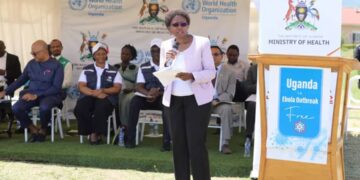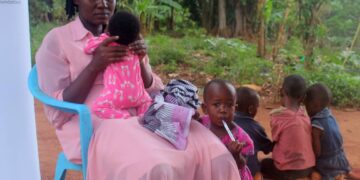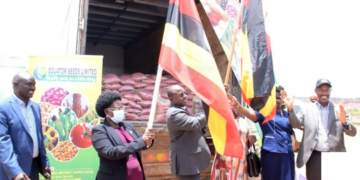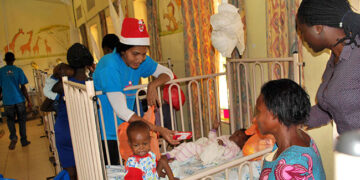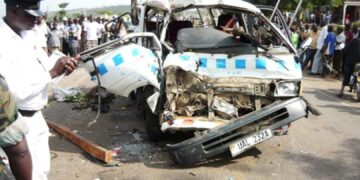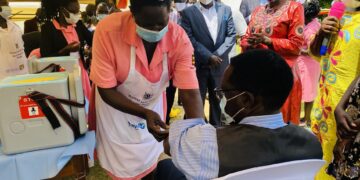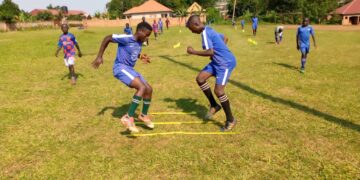By Jael Namiganda
There has been a notable enhancement in immunization statistics within Nakaseke District over the past four months, attributable to augmented funding in the health sector by AMREF International. Through their “Saving Lives and Livelihoods “initiative, AMREF has bolstered medical personnel to ensure comprehensive immunization for both children and adults.
Dr. Simon Aliga DHO Nakaseke
Dr. Simon Aliga, the District Health Officer of Nakaseke District Local Government, asserts that under the “Saving Lives and Livelihoods”project, AMREF has significantly contributed to the immunization program across all age demographics. This support has enabled the district to amplify both immunization coverage and quantities, particularly in remote communities.
He emphasized, “The immunization program they are endorsing encompasses all age groups from children to adults, as there are adults who also require vaccinations such as Yellow Fever and Hepatitis B. With the assistance of this funding, we are also able to conduct screenings for non-communicable diseases including hypertension, diabetes, and hepatitis.”
Dr. Simon noted that over the years, the district has integrated support for immunization services into its budget, with routine activities executed at health facilities and through outreach initiatives, underpinned by the Ministry of Health in collaboration with GAVI. However, the dearth of additional partners has considerably hampered immunization services and coverage due to constrained resources.
Nurse 
He remarked that AMREF has facilitated access to areas that are notoriously difficult to reach, owing to limited resources, by financing eight health facilities to conduct two outreach sessions per month. This intervention has markedly improved immunization coverage.
Mukagetale Gorrette, the Secretary for Finance in Nakaseke District, stated that through the project, the District Health Department has successfully established grassroots-level connections via its outreach endeavors. She noted that during the Child Health Days, AMREF significantly enhanced the initiative with UGX 30 million to ensure that children who had not received any doses, as well as those who had missed doses, were immunized.
Mukagetale Gorette sec. finance
“AMREF provided UGX 30 million out of the UGX 37 million required for the Child Health Days,” Gorrette elaborated. “These funds facilitated the transportation of health workers to the villages, supported the monitoring of the immunization process, and contributed to the capacity building of medical teams. They also empowered Village Health Teams (VHTs) to educate community members on the critical importance of immunization.”
Gorrette indicated that the underperformance in immunization within the district is largely attributable to the challenges posed by hard-to-reach areas and inadequate infrastructure, particularly during the rainy seasons. “We have regions in the district where individuals must traverse several kilometers to access the nearest health center for immunization. The roads are in a deplorable state, especially during the rainy season, rendering it arduous for mothers to transport their children for immunization. Some mothers are compelled to spend up to UGX 40,000 for a single trip merely to reach the health facility,” she added.

Nalubowa Rebecca, a mother of three and resident of Katoomba, expressed the difficulties faced by her and other mothers in securing immunization for their children due to exorbitant transport costs. However, with AMREF’s support, health workers have been able to provide immunization services directly within their communities.
Rebecca stated, “My child missed the 9-month vaccination owing to the prohibitive transport costs. I have to pay UGX 60,000 for a boda boda ride to and from the hospital, which is excessively burdensome for me and my peers. However, when the immunization services were brought closer to us through AMREF’s funding, we ensured that all our children received their vaccinations, including the doses they had previously missed.”

Senyange Edward, an enrolled nurse at Wakyato Health Center III, noted that children frequently missed immunization due to sparse populations and the considerable distances from their homes. Nevertheless, with AMREF’s involvement, they have been able to penetrate these hard-to-reach areas by providing what they term “combined virus services.” These services encompass immunization, antenatal care, HIV testing, treatment for urinary tract infections, malaria testing and treatment, TB screening, and sample collection — all of which aid the facility in achieving its health targets.
Gwanya Moses, the District Immunization Focal Person, indicated that additional outreach initiatives have been conducted to bring services closer to the populace, despite the challenges encountered. “Prior to AMREF’s involvement, the district was conducting 75 outreach sessions each month out of the 142 required, which was an insubstantial figure. However, with AMREF’s support, the number of outreach sessions has surged to 91 per month thus far.”
He noted that AMREF has facilitated capacity building for health staff as well as for non-health stakeholders, including politicians, religious leaders, school teachers, and other influential community figures. This is achieved through community sensitization dialogues to ensure the message regarding the availability of these services on the ground is widely disseminated.





